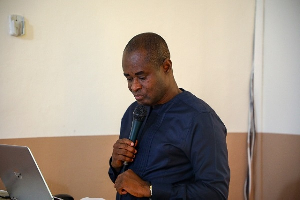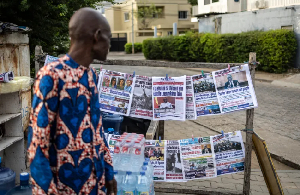The Alliance for a Green Revolution in Africa (AGRA) has supported the Ghana Land Policy Action Node to sensitize women and smallholder farmers in four selected traditional areas in the Northern Region.
This forms part of AGRA’s commitment to promote home grown policy efforts geared towards improving agriculture on the Africa continent as well as supporting Ghana’s Food and Agriculture Sector Development Policy II.
Currently in Ghana, access to land and the security of rights obtained by smallholder farmers and women is critically low. Therefore, AGRA’s goal of supporting the implementation of FASDEP II (Food and Agriculture Sector Development Policy II) for increased productivity and income for smallholder farmers will require improved access and security of land tenure for smallholder famers.
In the developing world, providing secure land tenure for small holder farmers has become a major tool for promoting economic growth, social development and poverty reduction.
It is within this context that AGRA spearheaded the formation of the Ghana Land Policy Action Node (G-LPAN) with the main objective of implementing projects that influence policy changes in the land sector geared towards the above goal. As part of its mandate, the Ghana Land Policy Action Node is implementing the Land Access and Tenure Security Improvement Project (LATSIP) in the Northern Region, one of the breadbasket areas under FASDEP II, with funding from AGRA.
The Land Access and Tenure Security Improvement Project (LATSIP) is designed with a goal of improving tenure security for existing small holder land users as well as access to land in four selected traditional areas of the Northern Region. The four traditional areas are Gulkpegu (Tamale), Bole, North Mo (Bamboi) and Damongo. It is therefore important that both men and women smallholder farmers who stand to benefit from agriculture interventions know where and how to access land and have secured use rights to their land.
WOMEN’S ROLE IN AGRICULTURE
Women play an important role in the agricultural value chain. In the project area women are generally recognized as the main producers and processors of food for household consumption, household income and livelihood as observed from field visits. Studies have also shown that the number of female-headed households, where women have become the sole breadwinners for their family either as a result of divorce, death of a spouse or shear neglect, is increasing.
The extent to which women are able to deal with these dynamics effectively and provide for the family’s needs is highly dependent on their access to, control over and ownership of productive resources particularly land. Unfortunately, women’s access and control over land and landed resources has remained limited mainly due to unfavorable socio-cultural factors that underpin customary land arrangements. This coupled with the nature of social organization and community leadership, limits women’s participation in public discussion and decision making on land.
INTERVENTION BY LATSIP
It is in recognition of the above issues that the LATSIP (Land Access and Tenure Security Improvement Project) put in place a deliberate arrangement to sensitize women in the project area in addition to having the general community sensitization events. The sensitization of women was targeted at ensuring special needs of women relating to land rights and land tenure security in the project area could be highlighted and addressed.
As such during the series of sessions held with these women participants, peculiar land rights issues of women in the project area were highlighted; they were taken through discussions on women’s land rights and both national and international instruments that underpin the protection of these rights and how they can take advantage of them. They were also enlightened on proper procedures for land acquisition, land documentation and means of securing land tenure. In all, 22 women groups were sensitized.
Specifically, these objectives were outlined for the sensitization;
• To highlight peculiar land rights issues of women in the project area;
• To sensitize women in the project area on women’s land rights and the national and international instruments that underpin the protection of these rights and how women can take advantage of them;
• To create awareness on proper procedures for land acquisition, land documentation and means of securing land tenure.
A section of some Christian women taking part in the sensitization process Certain critical issues emerged out of these sensitizations that are worthy of policy considerations. Land documentation has been recognized as one of the ways of securing use right in land. It was however revealed during the sensitization that existing customary land arrangements could make farm land documentation very difficult for smallholder farmers hence need policy intervention. Again there was widespread mentality of abundance of farm land.
As such, people do not actuality see the need to secure their use rights even though there were practical experiences of dispossession of smallholder farmers. This also calls for further efforts to deepen awareness creation that will disabuse such mentality and recondition their minds to realize to need to pursue endeavors particularly land documentation that secures their use rights.
RECOMMENDATIONS BY AGRA
As part of its lead role, AGRA has suggested that whilst the LATSIP seeks to improve the status of both male and female small holder farmers, a special case should be made for the female small holder due to the structural difficulties imposed on women by the culture and tradition of the area among others, through the incorporation of training in basic gender skills in the capacity building program for the Traditional Land Authorities.
Furthermore, special effort to target the women in the project area should go beyond the sensitization activity to include other activities like the ADR component of the LATSIP.
AGRA hopes that through its financial support to the Ghana Land Policy Action Node, it will make substantial in-roll in the land sector for positive policy changes that will inure to the benefit of smallholder farmers and Ghana as a whole.
Regional News of Tuesday, 23 December 2014
Source: COLANDEF
AGRA sensitizes women and smallholder farmers on land access and tenure security
Entertainment

LIVESTREAMING: Daddy Lumba's funeral ongoing in Kumasi
Opinions









